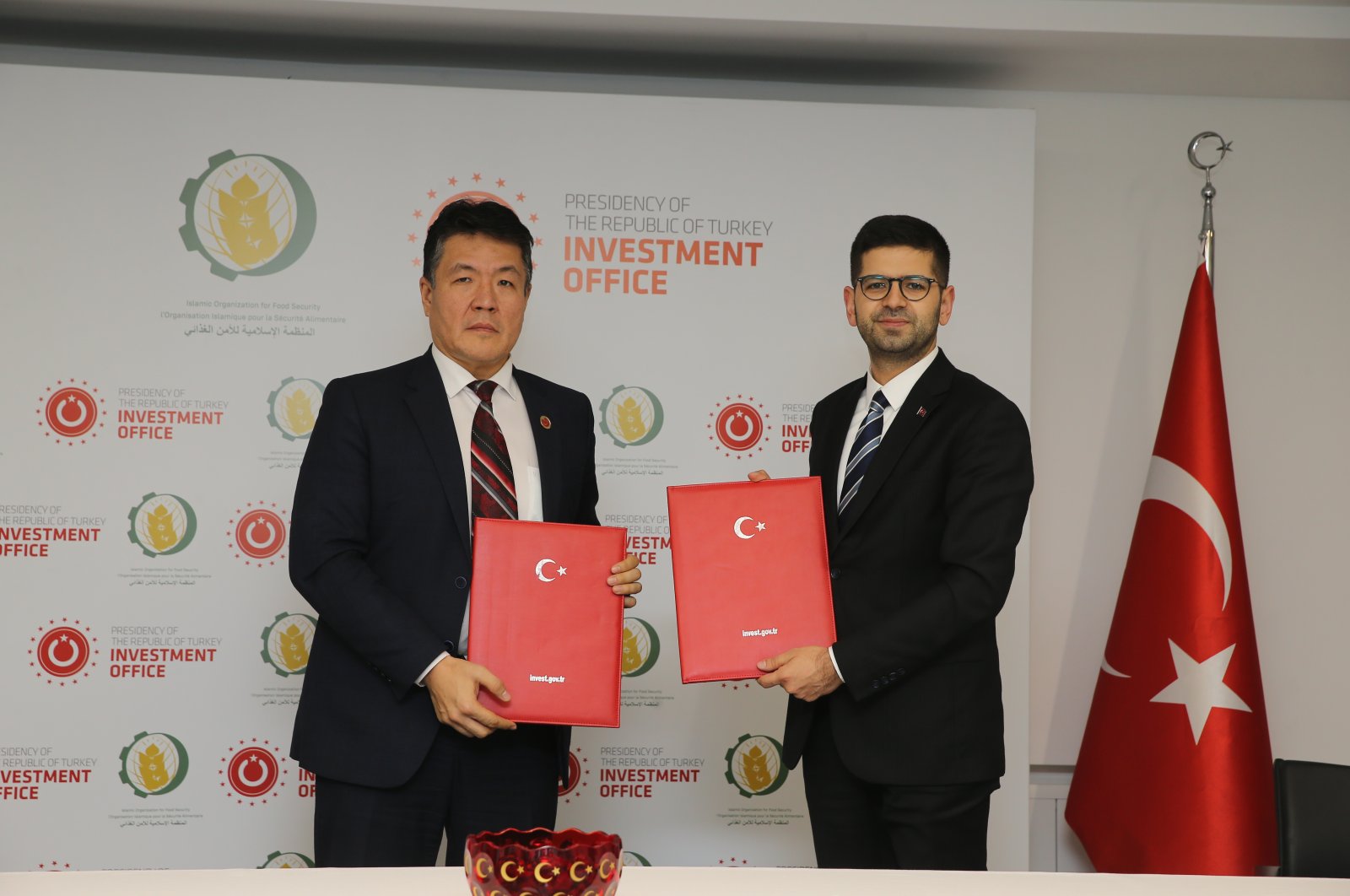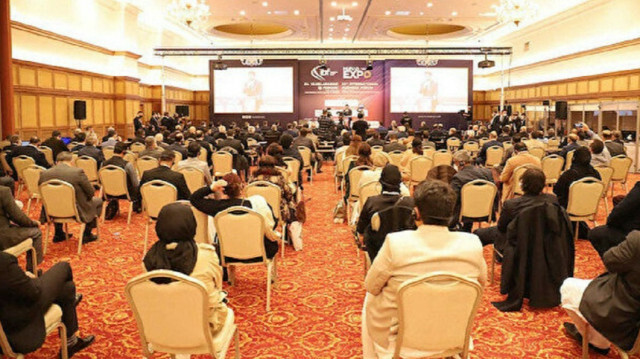
This article originally appeared on Ensia.
Tucked away in Masdar City, a quiet planned neighborhood in the emirate of Abu Dhabi that combines earth-tone Arabic architecture with wind turbines and other innovative technology, is a cluster of container-style buildings.
These containers are the site of Madar Farms, co-founded by Abdulaziz Al Mulla, a Kuwaiti entrepreneur based in the United Arab Emirates. Al Mulla began getting interested in food security while at the management consulting firm McKinsey & Co., where he worked with several of the region’s governments addressing a variety of national risk challenges. He left McKinsey after one particular project introduced him to the national security threats food and water challenges will bring to the region. He decided he wanted to do something about it, and ended up purchasing old shipping containers and transforming them into these indoor farms as a way to increase local food production. Today lettuce, basil, kale and other leafy greens grow without soil in trays that sit under red and blue LED lights, stacked in levels much like floors in a building.
“I was overwhelmed by the numbers: less than 5 percent of land in the Arabian Gulf is arable farmland (PDF). Despite this, over 80 percent of water use in our drier climate is used for agriculture. If we keep going at the same pace, we will deplete a significant amount of our natural resources in the next 50 years,” says Al Mulla. “This didn’t make sense to me, and I knew there had to be a better way. A week after this project, I resigned and began Madar Farms.”
This approach to indoor agriculture, known as vertical farming, has been gaining popularity in many parts of the world — the business consulting firm Grand View Research, Inc., estimates the global market will reach $9.96 billion by 2025 — but is still an emerging concept in the Middle East. Madar Farms — along with many other innovations attempting to lead to sustainable agriculture in the region — represents the humble beginnings of a new bid the UAE is taking on to end food shortage globally.
Home grown
Although the UAE currently is not short on food, its harsh climate and limited supplies of water and arable land offer little opportunity for agriculture, and over 80 percent of its food is imported. With increasing uncertainty around food production in the face of climate change and global political instability, the Middle Eastern country is looking to take on more of its own food production.
In November 2018, UAE minister for food security Mariam Al Mheiri launched a national food security strategy that aims to implement resilient agricultural practices that increase productivity and production. This primarily involves increasing investment in research and development of agriculture technologies and facilitating a market that supports agribusinesses.
Hina Kamal, a UAE-based food and nutrition researcher at United Arab Emirates University, explains that much of the focus is on boosting the use of agricultural technology required in both indoor and outdoor farming to increase homegrown produce. Kamal has been studying which produce is best suited for growth in UAE’s climate.
While Madar Farms is one of the first companies capitalizing on this interest, it isn’t the only one catching onto the trend. A growing number of companies, including more traditional outdoor farms, see similar opportunity.
Fruit farms in Abu Dhabi, UAE’s oil-rich capital, and Ras Al Khaimah, another emirate, for example, already have started testing and implementing drones to map farming areas that supply farmers as well as farming researchers with images, from bird’s-eye views of the fields to up-close images of individual plants. According to Fatima Al Hantoubi, head of environmental protection and natural reserves at Dibba Al Fujairah Municipality, a few organic farms in Ras Al Khaimah have started using sensors and artificial intelligence to improve seed selection, determine the amount of fertilizer needed for specific crops in specific soils and detect early signs of diseases.
In the Khor Fakkan area, meanwhile, the Ministry of Climate Change and the Environment has installed artificial caves in the Persian Gulf. The hope is to further contribute to food security by boosting fish stocks and promote sustainable fish farming.
Al Hantoubi explains that the caves were built out of eco-friendly materials and then placed along a stretch of the coast using cranes.
The initiative also includes the establishment of coral gardens over 9,100 square feet along the coast to help rehabilitate natural marine ecosystems in the area and to promote research and studies in marine biodiversity, which also will enhance the fisheries stock.
Food waste
While Al Mulla and others are using agriculture technology to boost food security, other approaches are also helping the UAE become self-reliant with respect to food.
Among them are efforts to address the issue of food waste. On average, each UAE resident wastes an estimated 434 pounds of food per year. Over 30 percent of that waste happens in restaurants, and another 30 percent is leftovers that get thrown out after family and corporate celebrations.
One of the UAE Ministry of Climate Change and the Environment’s newest projects is encouraging the use of artificial intelligence (AI) in kitchens, particularly in hotels and restaurants, to track food waste and guide kitchens on how to minimize it.
Huzaifa Waheed, an entrepreneur and a developer for food-waste-tracking software that is to hit the market soon, says that a main reason this technology can prove to be effective is because it is offering businesses a major cost-saving incentive. “And it helps the government meet its sustainability targets, making it a win-win,” he adds.
Over 100 of the biggest kitchens in the country, including major hotel groups such as Emaar and Majid Al Futtaim, already use AI to reduce food waste.
The computer vision–based product, launched in the UAE by the government and made by a food tech company called Winnow, uses a camera that sits over the kitchen’s bin to take pictures before and after food is thrown away. It then runs a classification algorithm to identify the discarded food, as well as its weight and cost. That information can be used to identify and address specific sources of food waste, such as spillage or preparation technique.
The AI program was launched as a proof-of-concept project in 2018. Through this program, the government is encouraging UAE’s lavish hospitality sector to save the equivalent of 2 million meals’ worth of wasted food in 2019 and 3 million in 2020, thanks to better decision making based on data. Several significant public and private entities in the UAE, including Dubai Municipality, Etihad Airways and Hilton Hotels, already have pledged to incorporate the program in their operations.
International cuisines
An issue that the UAE has yet to tackle is how to accommodate the discerning palate for international cuisines in a country that is home to over 200 nationalities and that has a high per capita consumption of staples such as rice, which require acres of tropical land to flourish.
“The major emphasis must be in increasing local production by focusing on targeted major staple foods and enhanced efficiency in the agriculture sector through constant investments in agricultural research and development for modern farming techniques,” Kamal says.
What this means is that in order to most effectively become self-reliant, the UAE needs to have an accurate sense of what food needs to be grown and how to do it at competitive prices.
According to Kamal, a more “holistic food security” is the only way UAE can proceed toward this goal. Government bodies, research institutions and commercial ventures, Kamal adds, need to work together to address the issues of research, technology, human capital and other factors that arise through the process.
“And perhaps not keep a specific year as the end-all target that has to be reached because it is not a realistic way to conduct research and development — at least not in a sustainable way,” Kamal says.
Overall, while the UAE’s efforts to tackle its food dependence can boost the food security in the region and diversify its economy, the success of its strategies will depend on how it tackles the many challenges in a sustainable way.
Editor’s note: Rabiya Jaffery wrote this story as a participant in the Ensia Mentor Program. The mentor for the project was Rachel Cernansky.



